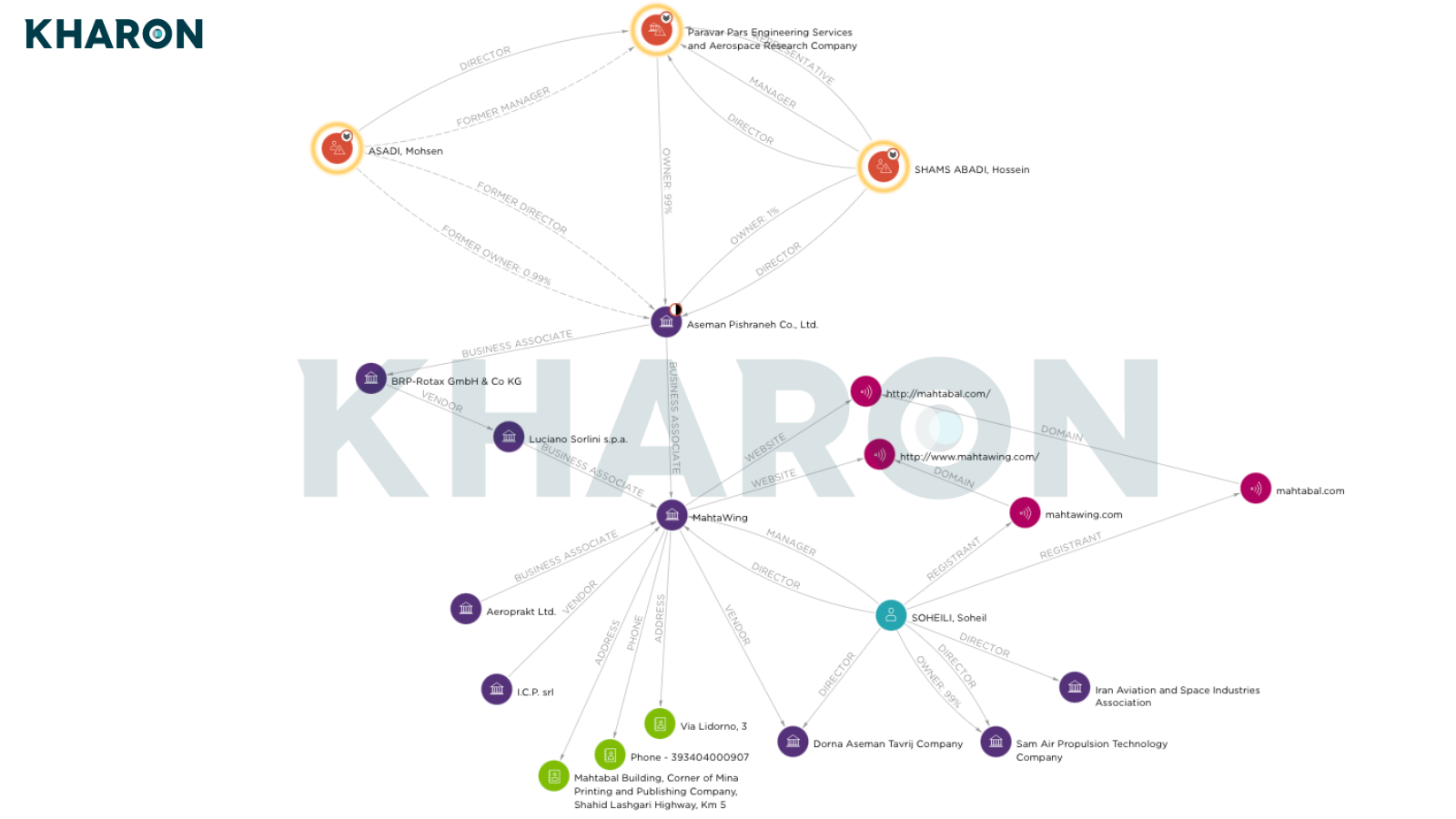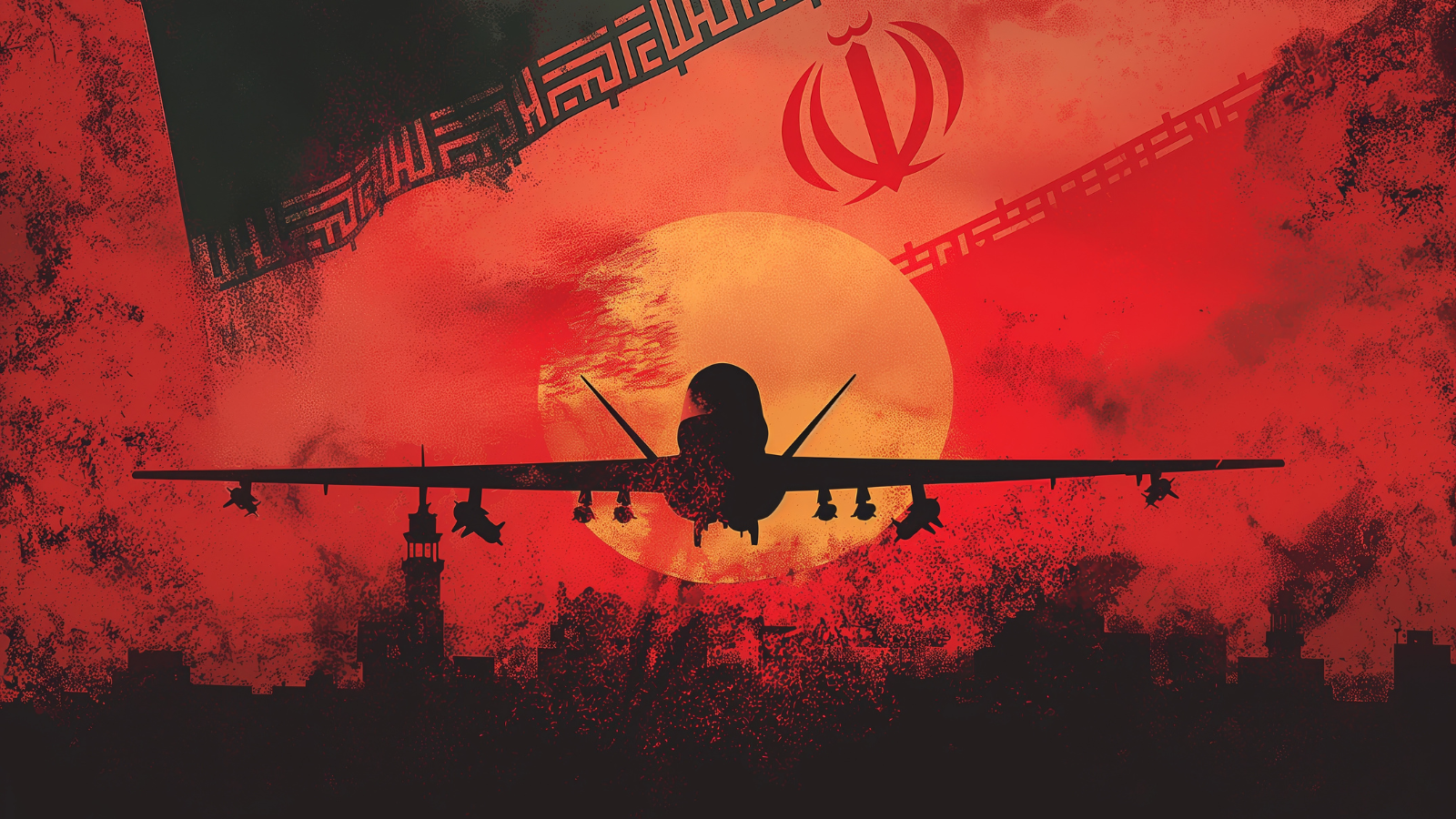In a coordinated move, the U.S. and U.K. governments announced on Thursday new sanctions against Iran that target its Unmanned Aerial Vehicle (UAV) sector and ballistic missile programs.
The sanctions were prompted by Iran’s attack against Israel on April 13. Iran fired over 300 drones, cruise missiles, and ballistic missiles in retaliation for Israel’s airstrike on its consulate in Syria earlier this month, which killed two Iranian generals and five officers.
This is the first in a series of upcoming sanctions actions following last weekend’s attack, which may extend to networks involved in the development, procurement, and facilitation of goods for Iran's UAV and ballistic missile programs.
Iran has long maintained an extensive network of overseas procurement agents, front companies, intermediaries, and suppliers to evade sanctions and obtain sensitive dual-use items, Kharon previously reported.
These procurement networks employ a variety of methods to evade export controls and sanctions, which include obscuring end users through a layered approach, routing shipments through several countries, and using deceptive tactics to access the U.S. and international financial systems.
The newly announced sanctions by the U.S. and U.K. illustrate an example of these tactics.
Procurement Abroad
Aseman Pishraneh was among the entities sanctioned for providing services to aircraft engines used in several types of Iranian drones, including the Shahed-129 and Mohajer-6.
According to the U.S. Department of the Treasury, Aseman Pishraneh is majority-owned by Paravar Pars Company, an Iranian drone maker that has previously been sanctioned by several governments for its involvement in manufacturing and testing UAVs for Iran’s Islamic Revolutionary Guard Corps Aerospace Force (IRGC ASF).
Mahtabal (“MahtaWing”), an Iran-registered aviation service and supply company, was also sanctioned by the U.K. for its involvement in the Iranian drone industry. On its website, the company lists an Italian phone number and an address in Trento, Italy.
A Kharon investigation found a number of connections between the two sanctioned companies that pre-date their recent designation.
Aseman Pishraneh lists MahtaWing as an affiliated company on its website but does not provide further context or detail on their relationship.
MahtaWing is one of the “support centers” for Italian aerospace company Luciano Sorlini, according to a review of both companies’ websites. Luciano Sorlini is a distributor of Rotax engines – an industry-leading brand of internal combustion engines – in Italy, Spain, Portugal, Türkiye, Croatia, Pakistan, Lebanon, and elsewhere.
Rotax engines are developed and manufactured by the Austrian company BRP-Rotax GmbH & Co KG, which is owned by Bombardier Recreational Products, a Canadian company.
These engines have been found in the Iranian Mohajer-6 drones that are reportedly being used by Russia in Ukraine, further highlighting the intricate web of global procurement facilitators that support Iran's military program.
MahtaWing’s managing director is an Iranian national who owns and chairs several other Iranian aviation and UAV companies.
The sanctions were prompted by Iran’s attack against Israel on April 13. Iran fired over 300 drones, cruise missiles, and ballistic missiles in retaliation for Israel’s airstrike on its consulate in Syria earlier this month, which killed two Iranian generals and five officers.
This is the first in a series of upcoming sanctions actions following last weekend’s attack, which may extend to networks involved in the development, procurement, and facilitation of goods for Iran's UAV and ballistic missile programs.
Iran has long maintained an extensive network of overseas procurement agents, front companies, intermediaries, and suppliers to evade sanctions and obtain sensitive dual-use items, Kharon previously reported.
These procurement networks employ a variety of methods to evade export controls and sanctions, which include obscuring end users through a layered approach, routing shipments through several countries, and using deceptive tactics to access the U.S. and international financial systems.
The newly announced sanctions by the U.S. and U.K. illustrate an example of these tactics.
Procurement Abroad
Aseman Pishraneh was among the entities sanctioned for providing services to aircraft engines used in several types of Iranian drones, including the Shahed-129 and Mohajer-6.
According to the U.S. Department of the Treasury, Aseman Pishraneh is majority-owned by Paravar Pars Company, an Iranian drone maker that has previously been sanctioned by several governments for its involvement in manufacturing and testing UAVs for Iran’s Islamic Revolutionary Guard Corps Aerospace Force (IRGC ASF).
Mahtabal (“MahtaWing”), an Iran-registered aviation service and supply company, was also sanctioned by the U.K. for its involvement in the Iranian drone industry. On its website, the company lists an Italian phone number and an address in Trento, Italy.
A Kharon investigation found a number of connections between the two sanctioned companies that pre-date their recent designation.
Aseman Pishraneh lists MahtaWing as an affiliated company on its website but does not provide further context or detail on their relationship.
MahtaWing is one of the “support centers” for Italian aerospace company Luciano Sorlini, according to a review of both companies’ websites. Luciano Sorlini is a distributor of Rotax engines – an industry-leading brand of internal combustion engines – in Italy, Spain, Portugal, Türkiye, Croatia, Pakistan, Lebanon, and elsewhere.
Rotax engines are developed and manufactured by the Austrian company BRP-Rotax GmbH & Co KG, which is owned by Bombardier Recreational Products, a Canadian company.
These engines have been found in the Iranian Mohajer-6 drones that are reportedly being used by Russia in Ukraine, further highlighting the intricate web of global procurement facilitators that support Iran's military program.
MahtaWing’s managing director is an Iranian national who owns and chairs several other Iranian aviation and UAV companies.

Kharon users can further explore these findings in ClearView. Click here to access.
More Sanctions to Follow
The new U.S. and U.K. designations come as more sanctions are expected to be announced in the coming days in response to last weekend’s attack on Israel.
Earlier this week, the Biden administration said it would impose new sanctions against Iran, including its missile program, in coordination with international partners.
The president of the European Council also announced on Thursday that new EU sanctions would be imposed on Iran’s drone and missile programs in response to the attack.
“It’s a clear signal that we want to send,” the president, Charles Michel, said after emerging from a meeting with leaders of member states in Brussels. “We need to isolate Iran.”
Months prior to last weekend’s attack, the U.S. government issued separate multi-agency advisories alerting private industry to the deceptive practices used by Iranian procurement networks to obtain foreign-produced goods and technologies in support of the country’s UAV and ballistic missile programs.
“Iran maintains an extensive overseas network of procurement agents, front companies, intermediaries, and suppliers to obtain sensitive dual-use items,” the U.S. said.
The new sanctions are a clear signal of the growing global consensus to disrupt these networks and degrade Iran's drone and missile capacity. Financial institutions and private industry will become a key partner in enforcing that effort.
“It is critical that private industry be aware of its legal obligations vis-a-vis entities and items involved in such procurement efforts, given the potential applicability of U.S. export controls and sanctions,” the U.S. noted.
The new U.S. and U.K. designations come as more sanctions are expected to be announced in the coming days in response to last weekend’s attack on Israel.
Earlier this week, the Biden administration said it would impose new sanctions against Iran, including its missile program, in coordination with international partners.
The president of the European Council also announced on Thursday that new EU sanctions would be imposed on Iran’s drone and missile programs in response to the attack.
“It’s a clear signal that we want to send,” the president, Charles Michel, said after emerging from a meeting with leaders of member states in Brussels. “We need to isolate Iran.”
Months prior to last weekend’s attack, the U.S. government issued separate multi-agency advisories alerting private industry to the deceptive practices used by Iranian procurement networks to obtain foreign-produced goods and technologies in support of the country’s UAV and ballistic missile programs.
“Iran maintains an extensive overseas network of procurement agents, front companies, intermediaries, and suppliers to obtain sensitive dual-use items,” the U.S. said.
The new sanctions are a clear signal of the growing global consensus to disrupt these networks and degrade Iran's drone and missile capacity. Financial institutions and private industry will become a key partner in enforcing that effort.
“It is critical that private industry be aware of its legal obligations vis-a-vis entities and items involved in such procurement efforts, given the potential applicability of U.S. export controls and sanctions,” the U.S. noted.







